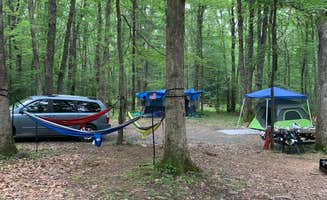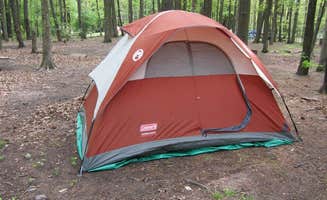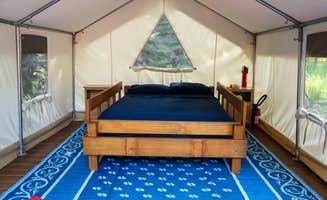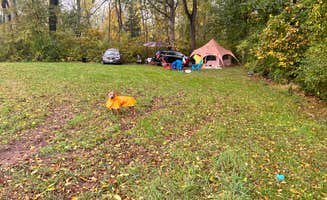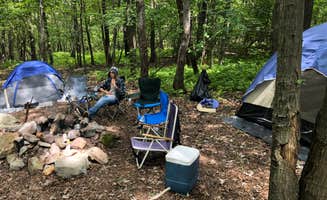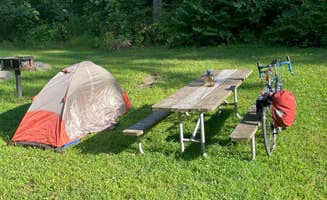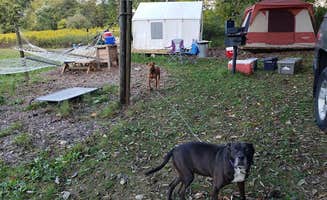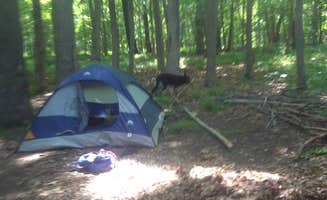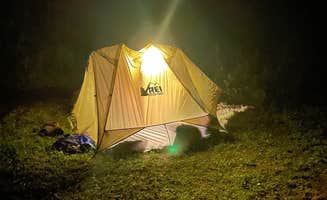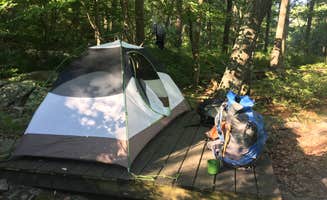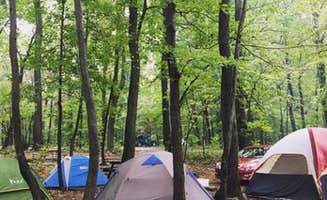Tent camping near Summit Hill, Pennsylvania occurs within the Pennsylvania Highlands region, ranging from 700 to 1,600 feet in elevation with mixed hardwood forests and ridge systems. The area contains a 40-mile portion of the Appalachian Trail corridor traversing Blue Mountain, creating a natural border between Carbon and Lehigh counties. Summer temperatures typically range from 55-85°F with precipitation highest in July and August.
What to do
Water recreation access: Mauch Chunk Lake Park offers multiple water-based activities within walking distance of campsites. "Our first time tent camping was here and it set a great tone. We set up the tent, kayaked on the lake, cooked up some dinner, watched a strawberry super moon rise over the lake," notes Emma T. The park maintains boat rentals and a swimming beach open seasonally.
Rafting adventures: Whitewater trips on the Lehigh River provide an accessible adventure for tent campers. "Rafting on the Lehigh with whitewater challengers was amazing," states Katie S. Outfitters operate April through October with trips ranging from family-friendly Class I to more challenging Class III sections depending on water releases from Francis E. Walter Dam.
Trail connectivity: Multiple campgrounds connect directly to the Delaware & Lehigh National Heritage Corridor trail system. "The park itself is located along the D&L biking trail that is on the bed of an old railroad," explains Asher K. about Riverview Park Campground. This 165-mile trail follows the historic routes of the Lehigh and Susquehanna Railroad.
What campers like
Ridge-top solitude: Primitive sites along the Appalachian Trail provide exceptional quiet compared to developed campgrounds. "Sitting up on the mountain in this area is a very peaceful experience as you can hear the wind blowing through the trees while watching the ferns sway back and forth," writes Asher K. about AT Ridge Campground near Lehigh Gap.
Group-friendly options: Several campgrounds specifically accommodate larger hiking or paddling groups. "This site sits a little ways back from the trail but is a nice quiet and secluded spot. There is a large established fire pit and many large flat areas that are perfect for tents," mentions Asher K. about AT Group Campsite near Lehigh Gap. The pine forest setting provides natural wind protection.
Convenience for adventure staging: Campgrounds situated along waterways allow for early starts on river trips. "This is the perfect place for camping if you are adventuring out on the Lehigh River and want to get an early start or stay the night," notes Asher K. Multiple access points along the river corridor allow for trip planning flexibility.
What you should know
Reservation requirements: Several campgrounds require advance booking to avoid additional charges. "Just make sure if you are going to stay here that you reserve a site in advance since they will charge you an additional $10 if you show up without planning," warns Asher K. about Riverview Park.
Water availability: Many primitive sites require carrying all water supplies. "There is no water access at the site so make sure to fill up before coming up the mountain," cautions Asher K. about Lehigh Gap AT primitive campsite. Trail hikers should plan to carry at least 2 liters per person for overnight stays.
Weekend crowds: Established campgrounds near Jim Thorpe experience heavy use during summer weekends. "We visited in the summer on a weekend when it was full. The campsites are too close to each other and we were surrounded by very loud campers," reports Danielle F. Weekday visits offer significantly better chances for quiet camping experiences.
Tips for camping with families
Beginner-friendly options: Some campgrounds specifically cater to first-time campers with accessible amenities. "I believe it is a great spot to go with people who haven't camped much before. It has flat tent spaces, generally clean bathrooms, and access to tons of things to do on the campground and nearby," explains Mackenzie B. about Mauch Chunk Lake Park.
Activity variety: Multiple recreation options keep children engaged during extended stays. "Volleyball courts, secret picnic areas, kayak and other boating rentals. Also a lot to do in the nearby town," reports Danny M. Most established campgrounds maintain designated swimming areas with seasonal lifeguards.
Ground conditions: Many forested sites have challenging terrain for tent setup. "Many sites have exposed tree roots and rocks, recommend extra padding for tenters," advises Amber M. Bringing foam padding or thicker sleeping mats helps ensure comfortable sleeping on uneven ground.
Tips from RVers
Site selection factors: Lakefront sites at Whitewater Challengers Adventure Center offer premium views but fill quickly during peak season. "Stayed here for Riverfest and it was great. Bands throughout the night with beer and food. Nice showers," reports Emma T. Their riverside campground accommodates RVs up to 32 feet with water hookups but no sewer connections.
Event scheduling awareness: Several campgrounds host regular music events and festivals that affect noise levels. "There was a movie shown at night, as well as music played late into the night," notes Katie S. Checking event calendars before booking ensures expectations match actual conditions, particularly for those seeking quiet natural settings.


